Vol. 5 インタビュー 都市研究ルジャックセンター
ジャカルタ市と共に ―― 新しい文化政策と新しいルジャック
Together with Jakarta City Mayor ―― New Cultural Policy and New Rujak
vol.5 インタビュー 都市研究ルジャックセンター、インドネシア
Interview Column 5: Rujak Center for Urban Studies, Indonesia
2015年より協議会で実施している「ASEAN諸国における企業メセナの促進とネットワーク構築に向けた調査・協議」(助成:国際交流基金アジアセンター)。本年は、この3年間交流を深めた各ASEAN文化団体へのインタビュー・コラムや、視察レポートを連載しています。
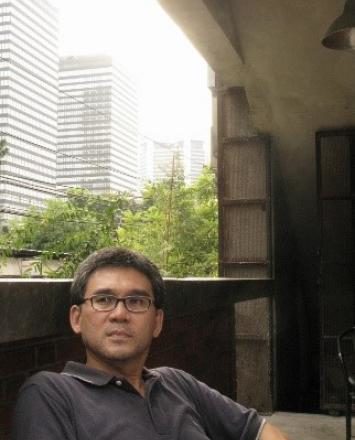
マルコ・クスマウィジャヤ(ディレクター)
Marco Kusumawijaya (Founder and Director)
都市研究ルジャックセンター
政治、芸術・文化、伝統、開発戦略、災害復興など多彩な分野で活躍する研究者や専門家により2010年に設立。エコロジカルな時代に移行するプロセスで生まれる差異を埋めるべく、持続可能な都市や地域を構築するための革新的な提案や実践を、コミュニティとともに取り組むことを目指す。ルジャックセンターでは生態系の集約である都市に注目し、気候変動や生態学的な災害から生き延びるだけでなく、都市問題から環境に対する意識を高めることで、現代と未来の人々の問題に焦点をあてている。https://rujak.org/
Rujak Center for Urban Studies (RCUS)
Founded in 2010, Rujak Center for Urban Studies (RCUS) aims to fill the gaps in the necessary process of transition into the ecological age. The vision of RCUS is working together with communities in generating innovative knowledge and practices to build sustainable cities and regions. RCUS focuses on cities as human territories that amalgamate most, if not all, of contemporary and future human problems. https://rujak.org/
――2016年3月にルジャックセンターの協力を得てジャカルタで国際会議を開催しまし、今年の1月に開催された東京会議ではインドネシアからティモセウス・レスマナ 氏(創立者/会長、インドネシア・フィランソロピー・アソシエーション)、とリンダ・ホエマー・アビディン氏(創立メンバー/執行委員会財務担当、インドネシア芸術連合)をお呼びしました。その後何か変化がありましたか?
Q: So let’s start with after-effect of Jakarta Conference in partnership with your Rujak Center last March. Also we have invited Mr. Timotheus Lesmana (Founder/Chairman, Indonesian Philanthropy Association) and Linda Hoemar Abidin (Founding Member / Treasurer of the Executive Board, The Indonesian Art Coalition) to Tokyo Conference in January. Has there been any new movements since then?
マルコ:実は私は、新しく選出されたジャカルタ市長の選挙キャンペーンに深く関わっています。私が支持していた立候補者が選挙に勝ち、市長となりました。現在、私は彼のチームに入っています。10月から市長として彼は市政を動かしていくことになりますが、私も彼とともに仕事をすることになります。ですから、芸術文化の分野からしばらく離れていました。
Marco: To tell you the truth, I have been involved deeply in new election for new mayor for Jakarta. So I supported one candidate, and he won. Now I am in his team, preparing for new government operation taking place in October. So in a way, I have been away from arts for some time.
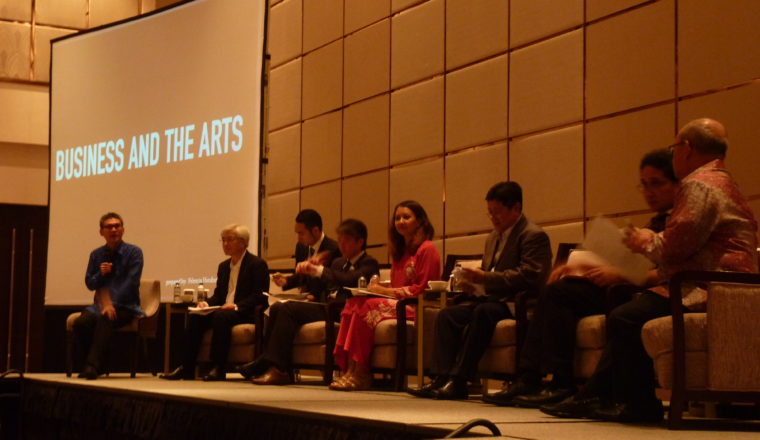
2016年3月ジャカルタ会議 |Jakarta Conference on March 2016
2016年3月のジャカルタ会議後、ある程度の効果はあったと思います。たとえば会議に参加していた人たちはとても興味を持ちました。芸術に特化したフィランソロピーを推進している組織である「企業メセナ協議会」というものが実在することに驚き、特に企業の芸術に対するサポートの姿勢というものを認識したのです。そういった意味では、ある程度の成果はでたかと思います。しかしながら、実際に何か動き始めたかというとそうでもないのが現状です。実際、ティモセウス・レスマナ 氏とリンダ・ホエマー・アビディン氏は、インドネシアにおける企業の芸術支援をリードしていく覚悟はできていますし、もちろん私も彼らが最初に推進していくべきだと伝えました。私はサポートとして彼らを支えていくつもりなのです。しかしながら、なかなかミーティングが開催されないのです。
Since the conference in Jakarta, of course there are changes in a sense. Invitees such as corporate leaders and philanthropy leaders were surprised with the existence of KMK as well as various corporate support activities for arts, and recognized the ways and approaches of corporations towards supporting arts. In that sense, I think that some achievements were made. However, that it is not so much whether we actually started something. Of course, Mr. Timothuse and Ms. Linda were ready to lead and promote corporate support for the arts in Indonesia, and of course I also told them that they should lead instead of me. And I will support them. However, meetings have not been held.
――では、政府はどうですか?政府から企業の芸術文化活動を支援するというような動きなどはありますか?2016年3月のジャカルタ会議では様々な政府関係者が参加していましたが…
Q: I see. So how about the government? Has there been any movement for the government to support artistic and cultural activities? There were many government officials at Jakarta Conference.
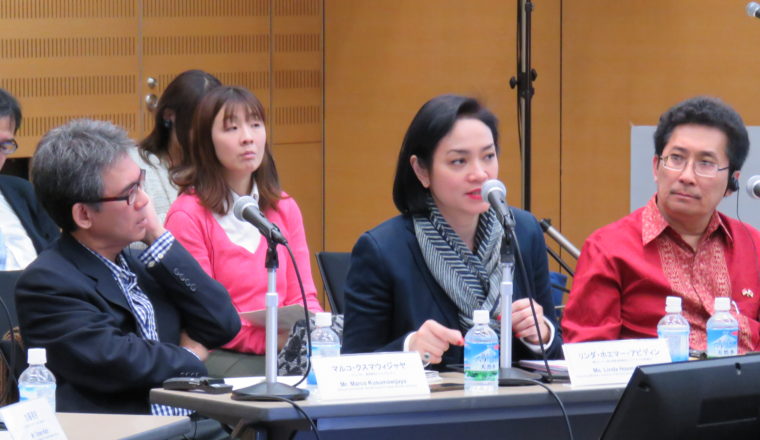
2017年1月の東京会議にて(左から)マルコ氏、リンダ氏、ティモセウス氏
At Tokyo Conference in January 2017 (From left) Mr. Marco Kusumawijaya, Ms. Linda Hoemar, and Mr. Timotheus Lesmana
マルコ:1月の会議の後、東京での視察や会議内容などを国政レベルの行政機関に報告しました。日本でいうところの文化庁長官と教育庁長官に報告しました。あと、行政機関のひとつであるクリエイティブ産業エージェンシーにも東京会議の報告をしました。彼らは皆、私たちをサポートする準備ができているのですが、問題はきちんとしたリーダーシップのもと進めなくてはいけないため誰かが責任を持つ必要があり、それがティモセウス、リンダ、もしくは私ということになります。
Marco: After the meeting in January, we reported Tokyo visits and meeting details to the government agency at national level. We reported to the Director General of the Agency for Cultural Affairs and the Directorate of Education. Also I gave a report of on the Tokyo conference to the creative industrial agency which is also one of the government agencies. They are all ready to support us, but since the problem has been who has to lead and be responsible, which is either Timothuse, Linda, or me.
――しかし、市長選挙キャンペーンや、そのチームに入って市政を動かす立場だとすると忙しくて、企業メセナを推進していくのは難しいのでは?
Q: But you are so busy working with the new government, it seems that it is difficult for you to take a leadership to promote corporate support for the arts.
しかし、良い面もあるのです。私自身が市長選挙キャンペーンチームにアシスタントとして関わっているので、その立場から色々な企業と連携を取り支援を受けることができるのではないかと考えているのです。新市長のもとにさまざまな企業が集まってくるので、こういった政策ができるのではないかと考えています。ジャカルタにある企業は多くがデベロッパーです。土地開発・ビル開発などを専門としています。私は彼らに芸術というものを紹介し興味を持ってもらおうと思っているのです。
But also there is a good side of me being involved in politics. Because I have been involved in mayor election campaign as an assistant, I can work with various corporations. Many corporations come to gather for new mayor of Jakarta, I am thinking that we can propose new cultural policy together with these corporations. Most of corporations in Jakarta are developers, specializing land development and building development. I would like to introduce arts to them and make them interested in it.
――なるほど。ではルジャックセンターに話をもどしましょうか。どのような理念を持っているのでしょうか?
Q: I see. Okay, let’s go back to Rujak Center. What is your philosophy?
マルコ:組織の名前からわかるように都市研究・都市開発を専門とする組織で、そのために必要な分野のエキスパートたちが集まっています。ルジャックセンターのミッションは都市研究の知識をコミュニティ・社会と共に提案し、つくりあげていくということです。コミュニティととても密接に連携しています。それは地域社会に住む人々の生活環境を、私たちが理解し良いのに変えていこうと考えてのことなのです。ですから、常に生態学や環境の変化に伴い、変わっていきます。生活環境も変わっていくなかで、そこに対応しつつ継続的な知識を生みだしていきます。その中で、私たちは芸術が都市研究において、創造性や異なる視点を生み出す上で、重要な役割を果たすと考えています。
Marco: As you can see from the name of the organization, it is an organization that specializes in urban studies and urban development, and experts are from various fields which are necessary for our mission. The mission is to propose and build urban study knowledge with communities and society. We work very closely with the communities. It is about thinking ways to change the living environment of the people living in the community. Therefore, it will always change as ecological and environmental change. As the living environment changes, we will continue to respond to it and generate continuous knowledge. Among them, we believe that art plays an important role in urban studies, bringing creativity and a different perspective.
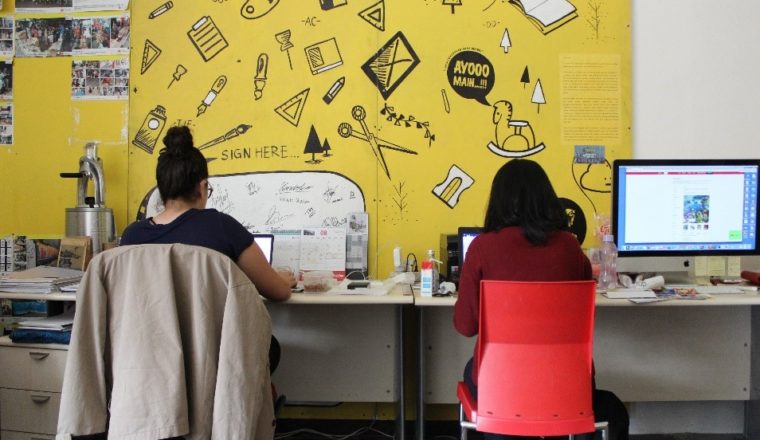
芸術感満載の新オフィス | New Artistic Office of Rujak Center
私たちのオフィスはジャカルタにあります。毎年アーティスト・イン・レジデンスプログラムも展開しています。ただし、今年は実施しません。なぜかというと新しいフェローシップ・レジデンスプログラムを来年展開しようと考えているからです。今までのプログラムでは、ただアーティストを招いて2~6ヶ月の期間滞在させ、作品をつくるということをしていました。今までには2名の日本アーティストも参加しているのですよ。
We still have a facility in Jakarta, and we have annual artist residency program except this year, because we are trying to do a different fellowship residency program for next year. In the past, we always just invited artists to stay and put their works 2-6 months in Jakarta. We have had 2 Japanese artists.
――では、アーティストの作品を保存しているのですね。
Q: So you actually keep their works?
マルコ:そうです。ルジャックセンターではこのような作品を展示会として公開したり、夏に開催される催し物などもあります。ジャカルタでは現在立ち退きを宣告されている4つのコミュニティがルジャックセンターの近隣にあります。このコミュニティをどうにかしたいと考えているのです。
Marco: We do. Rujak is installing some exhibitions and summer activities. We have communities currently in Jakarta, we have 4 communities against eviction and also to rebuild after eviction.
だからこそ、新しく来るジャカルタ市長に期待をしています。彼もまた、強制立ち退きに反対だからです。ジャカルタではここ2~3年の間に多くのコミュニティが立ち退きを余儀なくされています。だからこそ、ルジャックセンターもこういった問題を解決するために、政治的なことにも参加し連携を深めようとしているのです。新しい市長は立ち退きをしないと宣言していますから。それだけではありません。彼は、立ち退きが進み廃退した近隣地域やコミュニティを再生するとまで言ってくれたのです。だから、ルジャックセンターは芸術というツールを使い、このような衰退したコミュニティと共に活動しています。
So that is why we supported new incoming governor, he is also against the eviction. So they have been a lot of evictions past 2-3 years in Jakarta. That is why we mobilize ourselves politically electing governor who declares not to do eviction anymore. He said actually to rebuild neighborhood being demolished. So Rujak is working on the demolished neighborhood, using arts.
――このような活動もまた、ルジャックセンターとしての理念なのでしょうね。
Q: That is still a part of your philosophy as your organization.
マルコ:そうです。コミュニティとともに芸術活動することは、様々なことを学ぶ上で1つの方法であるし、また新しい知識を生み出す方法でもあります。しかし、それと同時に私たちがいる環境や私たちが経験していることを書面化する上でもとても良い表現になるのです。
Marco: So working with communities using arts as ways of knowing and producing knowledge, but at the same time, as a way to express and document your environment and experiences.
――ルジャックセンターの資本は?たとえば、株主などの制度はありますか?
Q: What is your annual asset? Do you have any shareholders’ system?
マルコ:私たちは財団です。ジョグ・ジャカルタに資本を持っています。資本といっても金銭でなく、広大な土地と建物ですが。ジャカルタにはオフィスしかありません。
Marco: We are a foundation. In Jog Jakarta, we have assets- a land and building. In Jakarta, we rent an office.
ルジャックセンターは最初、私の家からはじまりました。私の家がオフィスだったのです。それから、助成金を得てルジャックセンターとして漁業産業の活性化と運営方法を設立するプロジェクトを始めたのです。これが、ルジャックセンターとして初めての協働作業でしたね。
Well, we started our office in my house actually. But we started with a grant to establish our mission and admission. We got a grant to do work with the establishment of fishery and admission.
これはオランダのヒボス(Hivos)という、開発・発展に資金を援助している組織からです。それから、ヨーロッパにあるグーディという組織から1000ユーロほどの助成金をもらい、ルジャックセンターのウェブサイトを立ち上げ、自分たちの活動を始めました。それから少しずつですが、様々な巨額の資金援助や助成金などで活動を進めていきました。
It was from Hivos, Detsche development company, then we got a small grant from Goodies to start our website, around €1,000 to start our activities, then big grants started to came.
最初は、ルジャックセンターはただのオープンソサイエティでした。ただし、将来的には財団として設立しようという志をみな共有して始まったソサイエティです。少しずつ活動も増え、財団となり、やっと私の家ではなく別の場所にオフィスを構えることができました(笑)。私たちがしてきたことや組織自体はとても辛く苦しい道のりでした。時にはお金が全くなく、何ヶ月も支払いが滞ることもありました。
Actually it was an open society at first, then formed to a foundation. This started to grow and have a small office outside my house. So it was quite hard. We worked really hard to get where we are now. We didn’t have any start-up funds. Our work and organization was really struggling, there was a time we didn’t have any money and there were was a months without payment.
――共同設立者は何名いるのでしょうか?
Q: How many co-founders are they?
マルコ:一番最初のプロジェクトに参加したメンバーすべてということであれば13名です。ほとんどは今、財団に在籍していませんが、少なくともルジャックセンターとしてのミッションや理念を理解し共有したプロジェクトの中にいたということで、数えています。みんな全く違ったバックグラウンドから来ています。3~4名は建築家、文化研究を専門とする哲学者、環境に特化している科学者、社会学者など様々です。アーティストはいません。例えば現在も共同設立者として活動している哲学者はジョグ・ジャカルタにおいて文化研究に取り組んでいます。文化研究の中にも芸術分野は含まれていますよね。私自身、ルジャックセンターを立ち上げる前には、アーツカウンシル(ジャカルタ)で働いていましたから、芸術分野の知識はあります。ですので、アーティストではないですが、芸術分野も含む多彩な分野の専門家ということになるでしょうか。
Marco: If I am including all participants of forming workshop, then 13 people. They are not in the foundation, but they were in the workshop when we formulated our vision and mission, they were from different background like 3-4 architects, philosopher specializing cultural studies, environmental scientist, and sociologist. There were not artists. But you know, philosopher, co-founder of Rujak, is working on cultural studies in Jog Jakarta. There is a lot in arts. And as my background, I worked before in Jakarta Arts Council, so cross-mixed.
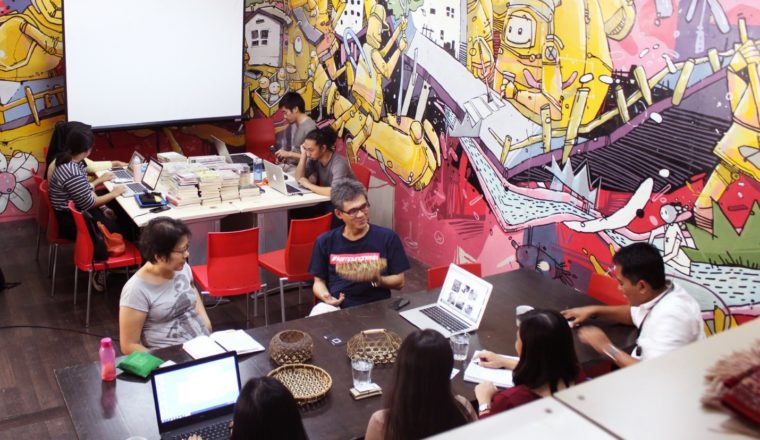
ルジャックセンター内での企業とのミーティングには多彩な専門家たちが様々な提案をしている。中央にいるのはマルコ氏
Meeting with Corporate Partners, proposed by experts from various fields. Center: Mr. Marco Kusuwawijaya
――ルジャックセンターでは現在何名が働いているのでしょうか?
Q: How many are working in Rujak today?
マルコ:今、現在は6名です。それから他に6名のインターンが在籍しています。プロフェッショナル職業として、インターンを受け入れているわけではなかったのですが、皆さん興味をもってくれていたようで応募が相次いだこともあってインターン受け入れを決めました。今は、きちんとルールや内規を決めた上で、定期的にインターンを受け入れています。インターンプログラムもきちんと制度化し、定期的なミーティングなどでコミュニケーション強化を図っています。なぜなら、現在のほうが昔よりも明らかに多くの事業を回しているからです。
Marco: 6 people. And we have 6 interns. We didn’t do the internship professionally or intentionally in the past, students just apply, so we accepted them. But now we do it more regularly in professional level like planning what the interns need to do, organize meeting all included. Also we have more works to do today.
――なるほど。では、1年にどれほどの事業を手がけているのでしょうか?
Q: I see. So how many annual events and programs do you run?
マルコ:プログラムでは、とても大きなプログラムを1つだけ行っています。これはほぼ1年がかりで行う大規模なものです。プログラムの中には沢山のイベントが含まれています。また、このプログラム自体がインドネシアの8都市で展開されるのです。だから、私たちも様々な都市に赴いて、様々なコミュニティと一緒にプログラムを行います。
Marco: In terms of program until now, we have one big program. But this program requires a lot of events. And this also takes place in 8 different cities in Indonesia. So we go out to different areas, work with different communities.
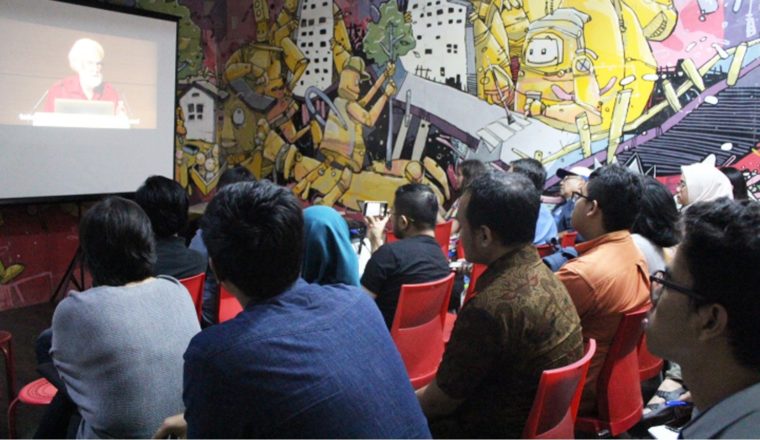
ルジャックセンターオフィス内でのイベント
それと同時に小さなプロジェクトがいくつかあったり、主催でなくヘルパーというような形でルジャックセンター以外のプロジェクトに参加したりです。例えば、ジャカルタ市内の強制立ち退きを余儀なくされたコミュニティと行っているものは、プログラム化されているわけではありません。徐々にプログラム化できるように進んでいるものです。
And at the same time, we have smaller projects and involvements in different ways. For example, our involvement in evicted communities in Jakarta is not actually programmed, just emerging.
それから、他のNGOや寄付者などと一緒にやるワークショップなどもあります。実際、つい最近東インドネシアでこのワークショップに参加し、帰ってきたところです。このワークショップは環境、海洋、地形など生態系保存に関するプログラムで、私は講師として呼ばれ、様々な講義をNGOや団体に行いました。このようなプログラムは1年に数回あります。そのほかに、アーティストとともに行うプログラムがいくつかあります。
And time to time, there are workshops with other NGOs, donors, and programs, in fact I just came back from East Indonesia, which was an has environment/ocean/geographic conservation program that I was called in to facilitate the lectures to other organizations and NGOs. These kinds of programs in several times a year. And then we have several projects with artists.
私たちは常に政治を重視しています。なぜなら、政治が文化政策を変えることができる方法だからです。ですから、ジャカルタの市長選挙が行われるとき、私たちは文化政策に関して助言をしました。今、ルジャックセンターはこの移行期間の政府チームと一員として共に活動しています。ですが、あくまでも私は外部の人間であって政府の人間ではありません。私たちは10月から始まる新しい市政のプログラムや政策を提案・企画しています。ですから、10月に市長が変わり新しい市政が始まった時点で私たちの仕事は終わりになるのです。
We always use politics as a way to change advocacy and policy. So when this emerging election in Jakarta happend, we advocated policies, and now we are in synchronization and transition team, to later take over the government. I will not be in the government, we are preparing program polices for the government, with new governor in October, we will dismiss ourselves.
――なるほど。すばらしいですね。ですが、ルジャックセンターにとってターゲットはあくまでもコミュニティですよね?
Q: I see, great. But I would imagine that your target is always the community.
マルコ:もちろん、そうです。ですが、第2のターゲットは適切な政策、つまりコミュニティを保護支援してくれる政策を作ることなのです。ですから、そのためには政府機関も含めて一緒に進めていく必要があるのです。私たちはコミュニティを助けるという第一の目的のために、政府とともに政策案を練っています。それは、もちろん様々な都市やコミュニティと継続可能なものにしていくという政策案でなくてはいけないのです。
Marco: Our target is always community, and secondly target is of course a policy that helps communities. So that would include the government of course. So we would work with the government with primary ideas or primary goal to help communities. And also for cities or any entities that changes towards sustainable society.
――なるほど。ルジャックセンターが設立され7年たちますが、いままでの中で一番大変だったことは何でしょうか?
Q: I see. Through 7 years since the establishment of Rujak, what was the most difficult thing?
マルコ:一番大変だった時期は実は設立当当時ではなく、しばらくたった中間時期でしょうか。なぜなら、レポート提出が遅れたり、何事にも丁寧に取り組んでいなかったし、助成金を失ったり、支援者との間で沢山のトラブルに直面したり、散々でした。今考えると、当時の私たちは経験が浅いということもありました。支援者や寄付者と共にプロジェクトをするということは、彼らは私たちの報告やレポートを期待するということです。トラブル続きでもう少しでブラックリストにも載るところだったのですよ(笑)。今はもう大丈夫です。
Marco: Most difficult time was not in the beginning, but in the middle, because we were late reporting, not efficient, losing grants, got into a lot of troubles with donors. Now we know we were not experienced at that time, when we work with different donors, they expect reports. We have to write reports. There was a time we also most black listed. But we are okay now.
一番困難だったことは何かというのは答えるのが難しいですね。なぜかというと今もまだ継続中だからです。それは、権限者たちによりよい政策を作ることが大切だとわかってもらうことです。より良い政策とは私たちにとってという意味ですが、私たち、コミュニティ、市民を指しています。これを私たちはエコ・ソーシャルアプローチと呼んでいますが、これは私たちは生態的な様々な問題を解決すると同時に、社会的・人間的問題も解決しなくてはいけないからです。この2つを切り離すことはできません。私が言っている権限者とは政府だけではありません。民間企業、ドナー(寄付者)、支援者なども含まれます。
I could not say that is the most difficult problem we faced. Most of problems are still going on, which is to convince the authorities to make better policies, according to us, which we now call eco-social approach, we need to solve ecological problems, and at the same time need to solve human problems. They cannot be separated. Authorities are not always the government, could be some donors and private sectors.
――なるほど。では、あなた方が行っている事業を通してコミュニティはどのようにルジャックセンターを認識しているのでしょうか?
Q: In terms of activities, how do the communities acknowledge you?
マルコ:主観的に見ると、社会は私たちを高い専門性を持ったNGO、また解決策を生み出して提供してくれるNGOとしてみているのではないでしょうか?では、私たちを頼ってくれているでしょうか?驚きますが、時にはそのような依頼をうけることもあるのです。例えば、今ジャカルタの北部のコミュニティと一緒に活動していますが、そのコミュニティの隣にある別のコミュニティからも同じようなプロジェクトをやってくれないかという依頼がありました。依頼はもちろん、コミュニティを良くするため、住みやすい場所にするためにプログラムを企画してほしいというものです。これは驚きでした。このコミュニティはとても閉鎖的で外部からの助け(政府からでさえ)を借りることに強い抵抗を感じていたからです。ですから、このような依頼を受けたときはすごく驚きましたし、反面とてもあたたかい気持ちになりました。
Q: If you ask me objectively, I think they have seen us as NGO that have expertise and NGO that are offering solutions which acknowledge the existence of community. And do they rely on us? Well- we got requests from them, which is emerging now, sometimes to our surprise. For example, we work with a community in North Jakarta, and got a request from a community next to it to help them improve their neighborhood, so for us it was a quite surprise because they had been very reluctant to get support from outside including the government. So we are very warmed by their request.
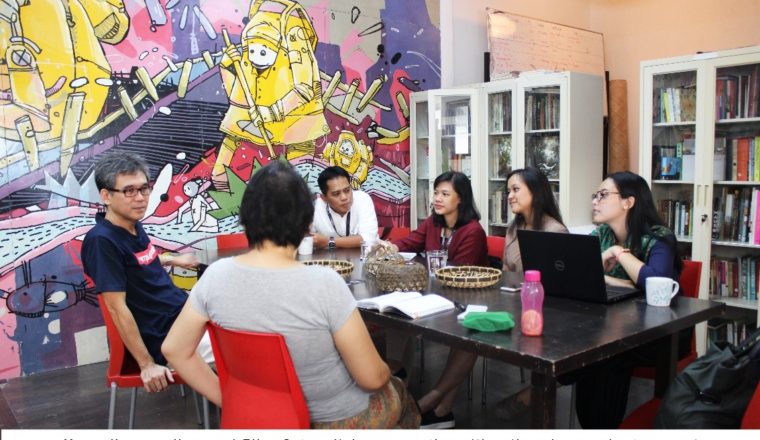
ジョグ・ジャカルタのネットショップ会社とのミーティングを行うマルコ氏
しかし、ジョグ・ジャカルタではそうはいかないのが現実です。ジョグ・ジャカルタには私たちが所有する土地と建物があると前に言いましたが、最初の2年間はとても難しかったのです。なぜなら、そこにすむコミュニティの人々にとって、私たちは外部の人間で、アーティストといういつも変わった人々を連れてきては何かしらしている、そのような存在だったからです。
しかし、彼らも徐々にアーティストという職種の人間を好きになっていきましたが、いまだに私たちのことは「ただ参加しているだけの人々」という認識のままなのです。
アーティストはコミュニティと共に活動し、参加を促します。そして、私たちはアーティストとコミュニティをつなげ協働作業を促しているのです。
今現在、ジョグ・ジャカルタにはフルタイムのコミュニティ・ファシリテーターが常勤しており常日頃からコミュニティとの協働を図っています。彼は今、コミュニティと共にいくつかのアクティビティを企画していて、私たちの所有地でプログラムを展開する予定です。
But, in Jog Jakarta where we have our own properties, first 2 years was very difficult. Because they saw us as just people bring other people, strange people namely artists, to them. They eventually liked artists themselves, still they see the program as lovely involving. Actually artists are always engaging them. They don’t see that we are engaging them to the artists. But we now have a permanent community facilitator working for us in Jog Jakarta, and he is organizing activities there with the community and community us our facilities for their activities.
――では、3~5年後のルジャックセンターのビジョンを教えてください?。
Q: What is your organization’s vision, 3-5 years from now?
ひとつお伝えすることがあります。私はルジャックセンターのリーダー・専務理事という立場を降りました。今もルジャックセンターの一員ですし、理事の一人であることには変わりませんが。今の専務理事は女性でエリサといいます。彼女もまた、最初のプロジェクトに参加した13人のうちの1人で、共同設立者の一人です。共同設立者のうちエグゼクティブ・ファンダーは私と、エリサ、そしてもう一人の3人になります。エリサはしばらくルジャックセンターから離れて、ユネスコで2年ほど働いていました。去年ルジャックセンターに戻ってきたので、私が彼女に専務理事になるようにお願いしたのです。私は政治活動に参加する予定でありましたしね。
都市や環境を保護保存するためのエコ・ソーシャルソリューションを提案できるようなよりよい政策を提案し続けることですね。
Marco: I need to tell you, actually I already resigned from executive leadership of Rujak. I am still in it, still a Director, just as a title. But Executive Director is now Elisa. She was a co-founder, and most active one when we started with 13 co-founders who attended 4-day workshop. Executive founders were me, Eliza and other. She went out of Rujak to work with UNESCO for 2 years. She has come back to Rujak since last year, and I asked her to be Executive Director because I wanted to get involved in politics. I will still work and advocate better policies that offering eco-social solutions that are preserving the environment, but at theat the same time, to work in collaboration with both private sectors and government.
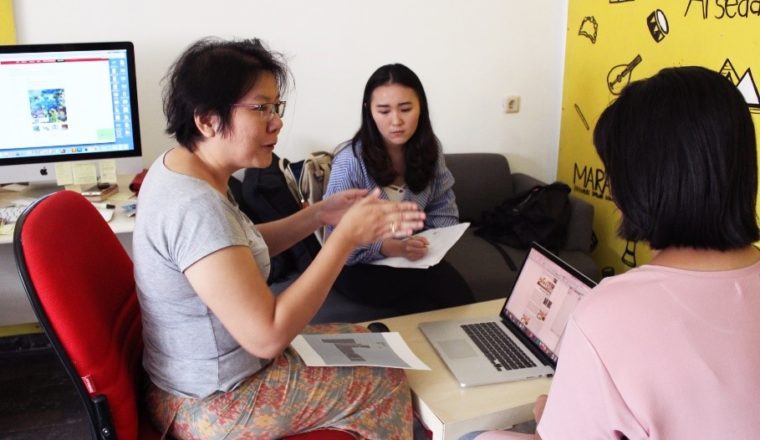
新専務理事のエリサ氏とスタッフ打ち合わせ
Elisa Sutanudajaja, Executive Diretor of Rujak debriefing its staff
私が専務理事から離れ、エリサに引き継いだ理由は、今の若い彼らに合った政策をルジャックセンターで発展させていってほしいと願ったからです。私は自分のしてきたことやアイディアに自信を持っていますが、新しい異なるアイディアに対してもオープンなのです。今、ルジャックセンターに必要なのは、私が行ってきたことから離れて新しいものを生み出すことなのです。だからこそ、私はエリサやエリサとともに働くスタッフにこう言ったのです。「ルジャックセンターをあなたたちが望むような形に発展させていきなさい。私が望む形ではなくて。もし、私がやってきたことと全く違うものでもいいのです。」
私は「継続」をあまり信じていません。どちらかというといい意味での「混乱・分裂」を信じています。いい意味での変化です。なぜなら、私はどの世代にもその世代にあった方針・方向があると思っているからです。皆が私はとても頼りになる、役にたつと思うのであれば、それは私の長い経験によるアイディアと経験値によるものでしょう。ですが、それが全てではないのです。すべては彼らが何をしたいか、なのです。これからのルジャックセンターを動かすのは、私がしてきたことの遺産ではなくて、新しい世代による新しいアイディアなのです。
The reason why I regisnedresigned and got Elisa is because I want them to develop according to their ways. I am confident in my own ideas, but also open to new ideas. So Rujak needs to move away from myself. That is why I told Elisa and others, to develop Rujak according to what they want, not what I want. It has to be completely different, that is fine with me. I don’t believe in so-called ‘continuity’, I actually believe in ‘disruption’. ‘Disruptive changes’ in a good way. So I believe every generation has their own challenges, and if you have found me useful, that is my experiences and ideas, which should not be the main thing. Main thing should be what they want. What drives Rujak is not because of my legacy, but based on new ideas.
――とても興味深いものです。これからもきっと何かしらいい形で関係を続けていけることを望みます。今日はどうもありがとうございました。
Q: What an interesting and inspiring insight. We wish to have good and positive relationship with you. Thank you very much.
マルコ:ありがとうございました。
Marco: Thank you very much.
インタビュー2017年5月2日
Interview held on 2 May
